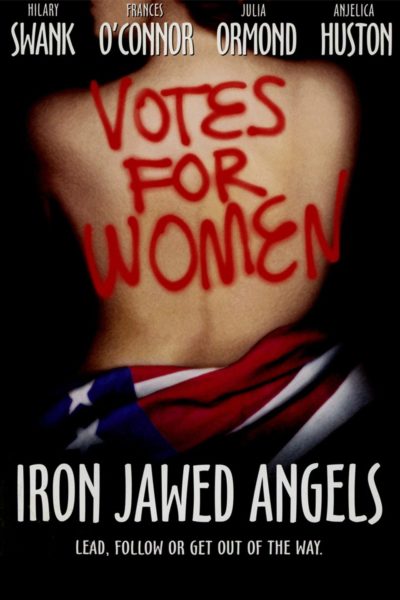★★
“Largely unable to get out the vote.”
 There’s a fascinating story to be told about the struggle by American women to get the vote. Unfortunately, this isn’t it. Rather than being content to tell the story of the battle and those who fought in it, von Garnier (a German director who gave us Bandits) seems to want to force these women from the 1910’s into modern feminist configurations. This position is set out particularly clearly in a deliberately anachronistic soundtrack, which at times makes the story feel more like Hamilton. And to be clear, that’s not a good thing. The focus is campaigner Alice Paul (Swank), beginning in 1912 when she returns from England, her passions set on fire by the work there of Emmeline Pankhurst, as documented in the rather better Suffragette.
There’s a fascinating story to be told about the struggle by American women to get the vote. Unfortunately, this isn’t it. Rather than being content to tell the story of the battle and those who fought in it, von Garnier (a German director who gave us Bandits) seems to want to force these women from the 1910’s into modern feminist configurations. This position is set out particularly clearly in a deliberately anachronistic soundtrack, which at times makes the story feel more like Hamilton. And to be clear, that’s not a good thing. The focus is campaigner Alice Paul (Swank), beginning in 1912 when she returns from England, her passions set on fire by the work there of Emmeline Pankhurst, as documented in the rather better Suffragette.
Alice initially seeks to work with the leading American group, the National American Woman’s Suffrage Association, led by Carrie Chapman Catt (Huston), only to find their methods not radical enough for her tastes. This eventually causes her to form her own group, and begin protesting against President Woodrow Wilson, including a daily picket of the White House. Matters come to a head after the United States enters World War I, with such protests being seen as unpatriotic. This leads to Paul and other women being arrested on dubious charges, and after beginning a hunger strike in protest, the women are force-fed. Eventually, Wilson is convinced to support their cause, with the 19th Amendment, giving women the right to vote, being passed in 1920.
My main problem is that Paul never feels an authentic character. She comes over more like a 21st century woman transplanted to the time, which as result, makes her story feel almost like a bad episode from the current incarnation of Doctor Who. It chooses to manipulate history purely for dramatic purposes, such as shoehorning in a romantic relationship with a newspaper cartoonist. Yet for all the obviously liberal credentials inherent in the story, according to the film, only one black woman supported the suffrage movement – and just for a minute or two, before exiting the film. Awkward, that.
Despite the above, and the film in general being a stylistic mess, you’d have to try particularly hard to screw up the underlying story, which is generally an empowering and rousing one. You’d have to be a colder heart than I, not to feel aggrieved by the treatment Paul and the other women suffer in pursuit of their cause, and the film does manage to do these elements justice, simply by reining back in the attempts to jazz things up. I was amused (and slightly pleased) by the disdain of NAWSA towards their bomb-flinging sisters across the Atlantic, who were rather keener on direct action. Though the main moment which amazed me was the scene where President Wilson walked out of the front gate of the White House, tipping his hat to the protestors as he passed them. Truly a different era.
Dir: Katja von Garnier
Star: Hilary Swank, Frances O’Connor, Julia Ormond, Anjelica Huston




